IN THE OPEN expanse of UCD playing fields rain thumps down and bodies are gathered tight under umbrellas to listen for what the new coach with a daunting job has to say.
The September downpour will soon leave footwear squelching and make victims of dictaphones, but not before the mics picked up the forthright, sharp explanation of what had gone awry in Joe Schmidt’s first competitive match in charge of Leinster.
“We have to be a lot more accurate. We were disappointingly loose with the ball… I thought we were naive in that we didn’t look after the ball as well as we needed to, weren’t disciplined enough.”
The language of the autopsy would become familiar refrains and tent-poles of the Kiwi’s success on this island. But for now, Schmidt continued on by explaining why he played Isa Nacewa at out-half in defeat to Glasgow and making a point of demanding a little more hunger for work on the record. Then he turned on his heels, eyes scanning the field as he ran into the thick of a high-tempo phase-play session and asked for it repeatedly without the middle men of the press, who plodded towards cover with no idea of the impact the rookie head coach would soon have on Irish rugby.
Schmidt didn’t quite land in Leinster with a blank canvas. Indeed, he came under considerable scrutiny and pressure after Michael Cheika laid the foundations of success, and delivered on them, for the eastern province.
Among the Australian’s final graces to Leinster was to signal his exit early in the 2009/10 season. And so the then reigning European champions had space and time to search for a character to build further.
The well-trodden tale goes that Schmidt called up his former Auckland charge Nacewa, intending to bring him to Clermont and Nacewa turned the 30-minute chat into a persuasive counter-offer.
Whether it was quite that simple, or whether the legendary utility back was just playing the role of honey pot to snare the then Clermont backs coach is now a moot point. Leinster officials and player interest had been suitably piqued by Nacewa’s recommendation.
“The big thing was that Isa had a connection with Joe. They would have had a good relationship from Auckland and he always thought he was going to be a very, very good coach,” Leinster head of rugby operations Guy Easterby tells The42.
“The criteria as well was important. Michael had come in and changed so many things from an organisational perspective. But I think the group then were looking for a really detailed, innovative coach who moved things on.”
By the time Clermont came to Dublin for a Heineken Cup quarter-final, which Leinster edged 29-28 after Brock James’ conspicuous absence from the closing stages, Schmidt’s name was ringing out at the top of the succession plan.
And a meeting with players including Nacewa, Leo Cullen, Brian O’Driscoll and 24-year-old Johnny Sexton copper-fastened the squad’s confidence that they had found their new conductor.
“(Schmidt) asked ‘what can I bring to you?’ and I think Johnny was the one who said ‘give us some direction and we’ll look after the rest.’
“That’s where we were, a strong playing group with a good mix. We’d had success, winning a Heineken Cup and they were all ready to take that next step.”
Ready for the next step. Although not necessarily prepared for the prod in that direction that Schmidt would inflict on them.
Though never uttered by the Kiwi on a live mic, it was never much of a secret that he arrived in Leinster and set a target of becoming the best passing team in Europe. The glittering array of talent may not have thought they were all that far off that title as things stood, but Schmidt’s eagle eye for errors, for room for improvement, kept minds razor-sharp and made players bust a gut to keep the ball off the deck.
Even O’Driscoll was not exempt from criticism as Schmidt’s Monday morning review sessions became infamous. The rookie head coach made something of an example of the star centre after moving an analysis session away from the quality of a pass towards him to inquire:
‘But Brian, was it a pass a world-class centre should still have caught?’
A big chunk out of the dressing-room’s big dog.
“That just triggers something,” O’Driscoll said of the ‘best passing team’ demand last month. It was by no means the only line in the sand he could see being drawn as the coach whose three years in Clermont culminated with an emotional Top14 victory continually lauded another brilliant blonde 13.
“I don’t know if he totally rated us as a team in Leinster, even though we won one European Cup and we beat them in the quarter-final of Europe before he came over.
“When we won our first European Cup under him, I think he kind of thought, ‘this is a good team’.
“(Aureliene) Rougerie, he used to call ‘Ro-Ro’ in team meetings. (And) ‘Ro-Ro’ was held up on this pedestal…
For the first while, because he spent time with (Clermont) and saw their skill levels, we felt as though he thought that they were a better team than us. But I think we managed to turn that around and change his opinion.”
Plenty of stick then, with the carrot dangled ahead that of an attacking style and the promise of trophies.
“Maybe we thought we were better at (passing) than we were,” adds O’Driscoll, “it also means the type of game we’re trying to play, we’re trying to play a passing game and it’s exciting.
“If he came in and said, ‘I want to turn you into the best ball-carrying team in Europe’ then you’re thinking, ‘I better get in the weights room’… whereas the best passing team equates to trying to play a brand where passing is a necessitated and being good passers can be the difference.
“It was an exciting thing for him to say, because we knew there was scope for improvement but also that meant an evolution of our game into the style that we like to play as well.”
Passing was merely the title up on the marquee for Schmidt, however. Every aspect of the game fed into that goal.
“It wasn’t just about passing,” notes Easterby, “it was about all the basic skills you need to be a good rugby player as an individual. But when all the individuals are improving, it improves the team and their level of competence in delivering those skills.
“He just wanted people to do the basics really well from the outset. Part of Joe’s great skill as a coach is being able to analyse opposition teams, but also understand how the group he has can play their best approach to a game.
“But that’s irrelevant if you haven’t got skills to deliver the gameplan based on the analysis and how Joe sees the game.
“So from the outset Joe knew he needed to bring the skills because that’s what he wanted to deliver from a player perspective. And he was obsessive about making the basic skills unbelievably good, so he made sure they trained continuously to make them good.
“It was clear that Joe had a good attacking brain, so we were going to play an attacking brand of rugby, but you needed to have those core skills in place before you could think about how you were going to deliver those on a given weekend.”
‘What made me behave that way?’
Schmidt’s Rome wasn’t built in a day exactly. The Kiwi was subjected to early flak from the national broadcaster’s highest-profile pundit amidst a run that featured one win in his opening four Celtic League fixtures.
Yet there was a mindset of consistency that ran through Leinster’s preparation. So as searing as Schmidt’s post-match reviews could be, panic was never a suitable word for the team’s situation. The language brought towards media dealings was wedged with ‘learnings’ and focus was invariably trained on the next task. Not alone was the next game the most important one, they sought out excellence at training so that it would come naturally on matchday.
‘You are what you do every day,’ Jamie Heaslip was often heard to say, and the number 8 typified the messages being pushed by Schmidt.
“At the time we had this ‘next ball’ kind of focus. A mistake is made, onto the next ball. You lose a game, next game, next ball,” says Heaslip.
“It kind of became a bit of a mantra and we were always like, ‘do a job, analyse it and move on.’ And when you were in the game it’s ‘do a job, get on to the next job, do a job, get on to the next one…’”
Heaslip recalls feeling spoilt at the array of medals and memories of ‘beautiful days‘ he collected and can now look back on. And in the seasons when Leinster struggled after Schmidt’s departure for Lansdowne Road he felt the sting of defeats far more acutely than he had savoured success.
“We maybe got a little bit too next-ball focused and didn’t enjoy the good moments because we were really lucky and spoilt that we had so many good moments in that era. But then when we weren’t winning or winning trophies that you were kind of like, ‘oh yeah, I don’t like this feeling’.
“I got too used to winning but we didn’t enjoy it enough. That’s why I think it’s important to enjoy those celebrations, enjoy those wins because at the end of the day, it’s sport, you play for the fun of it. There’s a lot of fun parts to it, winning is one of them. I just really liked winning when I was playing.”
From a humbling run of early form, through the mind-sharpening European pool draw that sent them to take on Saracens in Wembley before December back-to-backs with Schmidt’s former employers Clermont, the eastern province quickly found their feet with the steady rhythm of Schmidt’s demand for continuous improvement.
Having tasted both edges of the sword when playing their big games in Croke Park, the Aviva Stadium became comfortable second home under Schmidt and it was the scene of memorable knockout wins over fellow European luminaries Leicester and Toulouse in that fantastic first year under Schmidt.
On top of the outlook that changed within Leinster training during Schmidt’s time, his three years in charge saw the literal lay of the land around Leinster headquarters altered too.
When Schmidt arrived, the team was based in Donnybrook’s David Lloyd gym and trained where anyone ambling by could see them. These days, they are in a purpose-built HQ in UCD and can get their on-field work done behind the privacy of a hedge. Schmidt was embedded in the decision-making process at the time, but it was a part of Leinster’s long-term push to improve facilities rather than a one-man job.
“The big changes really came in Cheika’s time,” adds Easterby.
The house that Joe built owes a debt to pre-existing foundations.
“There were a lot of things he put in place that enabled Leinster to be successful and fulfil their potential – that’s an ongoing thing anyway. Michael had done a lot of that work around setting us up as an organisation to be successful.
“What worked well was Joe, his coaching ability was unbelievable and that’s what the team needed at the time.”
Schmidt’s impact was an astounding one. If he did feel the pressure from outside in that early month, it likely paled in comparison to the demands he made of himself.
He would speak openly about the sleepless nights, fretting over the most minute of details to ensure that losses like the opening night in Firhill were not the defining moments of the season.
The roof was closed in Cardiff when the crowning glory of his first year as a head coach arrived.
And as the strains and strings of One Day Like This filled the Millennium Stadium after a brilliant blue 27-point burst delivered a momentous comeback win over Northampton, the dank downpour in Schmidt’s first week was already long forgotten.
The42 is on Instagram! Tap the button below on your phone to follow us!






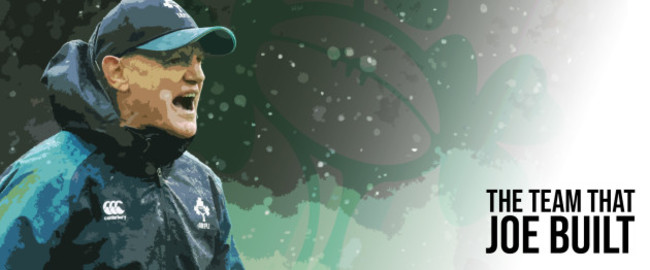
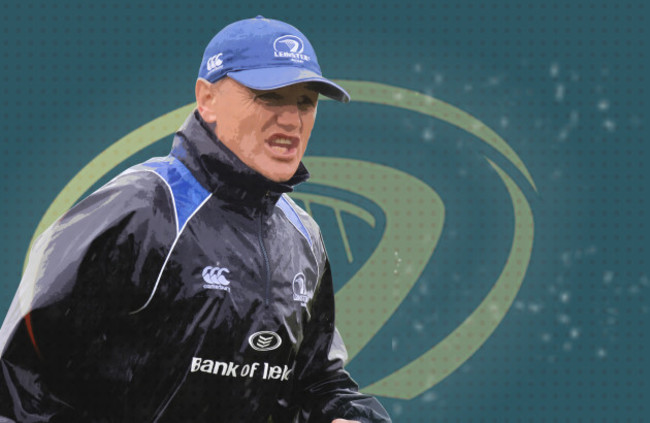
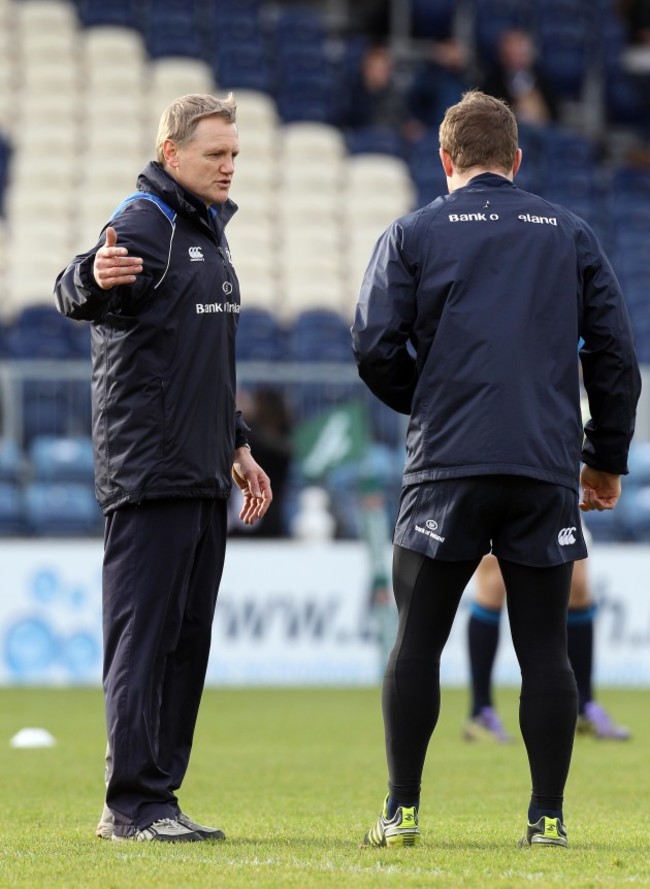
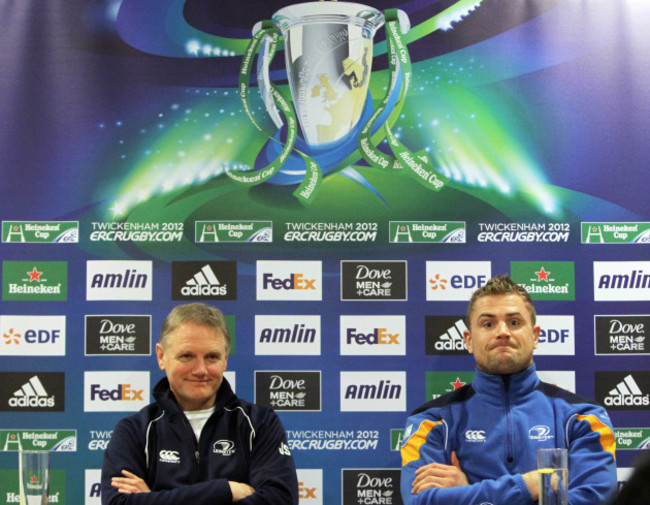
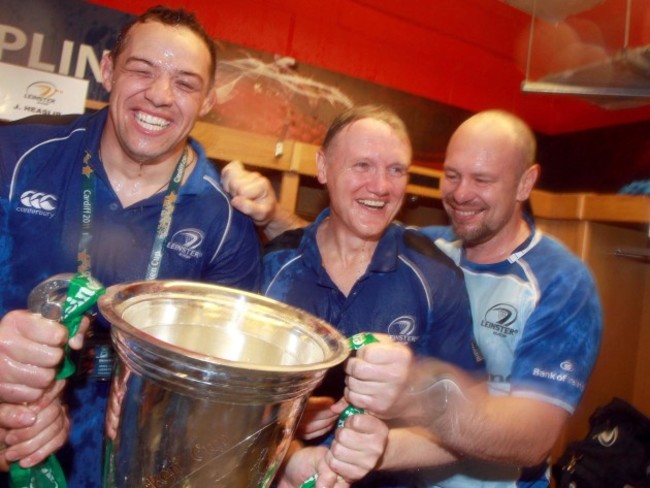


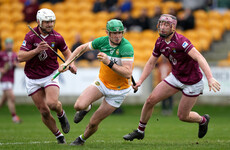
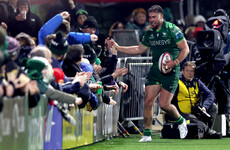
That man’s ego is off the richter scale. Also very unsettling to everyone around him.
Aaaaaaaaand he’s off!
A raise or I’m off ! Simple as . Gun and head comes to mind .
Following the example set by Declan Rice.
Wolves bound I’d say